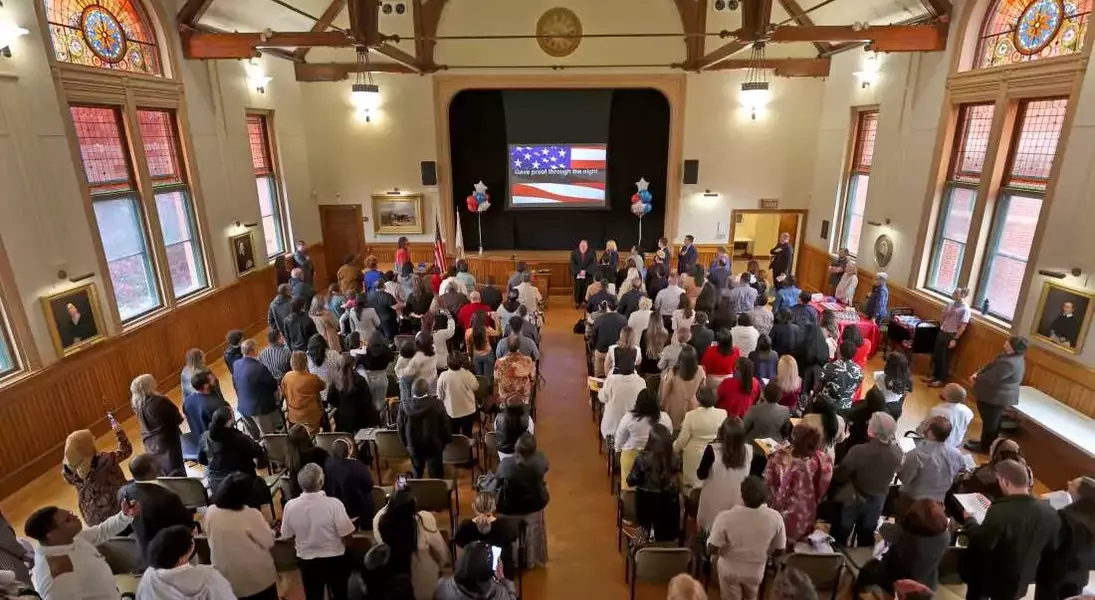
Presidential addresses to new citizens at naturalization ceremonies have long served as significant touchstones, reflecting the nation's evolving views on immigration and inclusion. These video messages, a tradition spanning two decades, are more than mere formalities; they are carefully crafted statements that reveal a president's philosophy on what it means to be American and the role of newcomers in the national tapestry. The recent message from former President Trump, however, marks a notable deviation from the welcoming and diversity-focused themes typically espoused by his predecessors. His emphasis on guarding American culture and a 'national family' concept signals a distinct shift in the narrative surrounding citizenship, emphasizing duty and preservation over the traditional celebration of immigrants' contributions and the richness their diverse backgrounds bring to the country. This change prompts reflection on the historical context of such presidential remarks and their profound implications for how newly naturalized individuals perceive their place within the United States.
Historically, these presidential welcomes have underscored the enriching impact of immigration on the country's social fabric. Past leaders have often highlighted the courage, resilience, and unique perspectives that immigrants bring, portraying the United States as a land built by and continuously renewed through the efforts of those who choose to make it their home. This celebratory tone has traditionally sought to integrate new citizens by affirming their value and acknowledging the arduous journey many undertake to become part of the American story. Such messages have reinforced the idea that diversity is a strength, emphasizing the nation's inclusive character and its ongoing commitment to welcoming people from all walks of life. The rhetoric of previous administrations has consistently framed citizenship as a mutual exchange, where both the individual and the nation benefit from the process of naturalization, fostering a sense of belonging and shared purpose within a vibrant, multicultural society.
Shifting Tones in Citizenship Welcomes
For two decades, U.S. presidents have consistently delivered video messages at naturalization ceremonies, articulating their perspectives on citizenship and immigration. These addresses, though brief, offer crucial insights into each administration's values and broader national vision. They serve as a unique platform to shape public understanding of what it means to become an American. The content of these messages, whether emphasizing opportunity, responsibility, or the nation's diverse heritage, directly reflects the prevailing political and social climate, providing a historical record of how different leaders have chosen to define American identity and the role of new citizens within it. This tradition underscores the symbolic importance of naturalization as a rite of passage and the president's role in welcoming new members into the national community.
Former President Trump's recent message to newly naturalized citizens significantly departed from the conventional themes embraced by previous administrations. While earlier presidents frequently celebrated the diverse backgrounds and contributions of immigrants, Trump's address shifted focus to the concept of a 'national family' and the responsibility to 'fiercely guard' American culture, including freedoms such as speech, religion, and the right to bear arms. This rhetoric, seen by some experts as less celebratory and more prescriptive, emphasizes the privileges of citizenship rather than the mutual benefits of immigration. Unlike his predecessors, who often acknowledged immigrants' sacrifices and the nation's identity as a melting pot, Trump's message largely omitted references to the immigrant journey or the enriching effects of diversity. Instead, it presented citizenship as a gift that entails a strict obligation to preserve existing cultural norms, aligning with a more nationalist and conservative viewpoint on American identity and belonging.
Implications of Evolving Presidential Rhetoric
The changing emphasis in presidential messages to new citizens reflects a broader evolution in the national discourse surrounding immigration. While previous presidents often embraced a narrative of inclusion and the transformative power of diverse perspectives, the recent shift towards an emphasis on cultural preservation signals a more insular approach. This subtle yet significant change in rhetoric can have profound implications for how new citizens perceive their role and responsibilities within American society. It also influences public opinion on immigration, potentially fostering a less welcoming environment for those seeking to join the national family. Understanding these evolving narratives is crucial for comprehending the ongoing debate about American identity and the future of its diverse populace.
This divergence in messaging not only highlights varying philosophies on immigration but also reveals distinct visions for the future of the nation. Presidents like Biden have underscored the notion of the United States as a "nation of immigrants," acknowledging the personal journeys and sacrifices made by newcomers, including their own ancestors. This approach contrasts sharply with Trump's rhetoric, which political analysts suggest avoids the term "immigrant" and instead focuses on a unified, culturally homogeneous "national family" that prioritizes loyalty and obligation to existing American values. This distinction is particularly evident in Trump's inclusion of specific rights, such as the right to bear arms, a theme uncharacteristic of past ceremonial speeches. Such an emphasis resonates strongly with traditional conservative principles, reinforcing an "America First" ideology and signaling a shift from universalistic values to a more particularistic understanding of American identity. The differing approaches underscore the ongoing ideological battle over how the United States defines itself and its relationship with those who seek to become part of its fabric.
